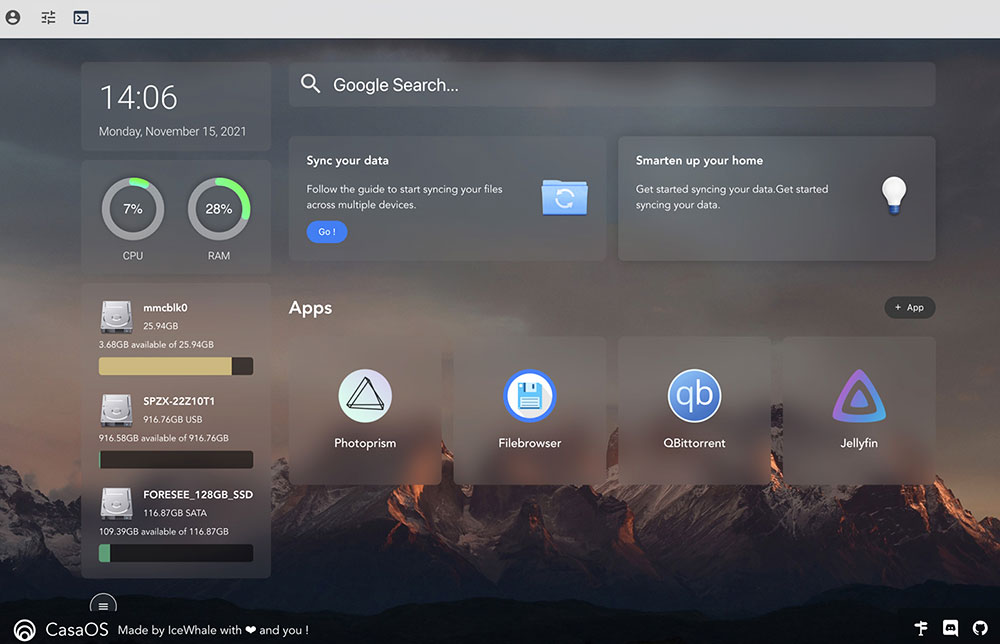Here are some of the latest developments in the world of open-source software.
– A German state is using the Linux OS to push Microsoft out the window over the next four years. Other governmental agencies on numerous continents have toyed with replacing Microsoft Word with the OpenOffice suite. Some succeeded; others failed.
– More agencies are turning to open-source solutions to sidestep proprietary licensing fees and improve productivity. Schleswig-Holstein state in Germany is the latest revolutionary rebelling against Micro$oft.
– A few popular Linux distributions threw caution to the wind. MX Linux, Endless OS, POP_OS!, and Deepin, to name a few, released new versions in recent weeks filled with innovations and updates worthy of checking out.
– The Linux Foundation is engaged in a new quantum computing project. Remember the Singularity project? LF reinvented it with Apptainer for working with high-performance computing (HPC).
– Do you want a simpler cloud computing experience in your home? Check out the new distro called CasaOS.
– Lastly, find out how you can get a new job by being Linux-smart.
German State Switching 25,000 Windows PCs to Linux and LibreOffice
The German state of Schleswig-Holstein plans to start using Linux and LibreOffice to replace Microsoft Windows and its Office suite in their administration and schools to migrate public organizations to open-source solutions.
The Document Foundation, the non-profit entity behind LibreOffice, on Nov. 18, announced the news in its blog. The software swap out is part of that government’s plan to reduce its dependence on proprietary software.
The end game is to stop using proprietary products altogether eventually. By the end of 2026, the plan will replace Microsoft Office with LibreOffice on all 25,000 computers used by government workers and teachers. Schleswig-Holstein officials will replace the Windows operating system with GNU/Linux.
New MX Linux Not Fit for Older Hardware
The distro’s developers officially unveiled MX Linux 21 last month while introducing a new Fluxbox edition. Soon afterward, the devs released an Advanced Hardware Support (AHS) ISOthat runs primarily on more modern computers. MX Linux traditionally runs on older, less powerful computers.
Fluxbox is a window manager that works seamlessly on high-end computers but is light on resources. MX Linux 21 is based on Debian 11 “Bullseye” running Linux Kernel 5.10LTS.
MX Linux 21 AHS Edition includes the newer 5.14 kernel and graphics stack tailored for capable hardware that can handle updated versions of Mesa, Vulkan, and XOrg. It comes with the Xfce desktop environment by default with some significant improvements.
See the official announcement here.
Endless Distro Carries On
Endless OS 4.0 is a long-term support version release with numerous usability improvements. It comes with default apps distributed as Flatpak packages.
Improvements include improved app grid navigation, faster user switching, new default wallpaper, and driverless printing.
Endless OS is a Debian-based Linux distro that focuses on bundling several important applications and resources to help make the most out of computers without needing an internet connection. It is primarily tailored for education and for users who do not have constant access to the internet.
The official release notes are available here.
Deepin 20.3 Offers New Kernel Option, Screen Capture Mode
Deepin 20.3 lets you choose Linux Kernel 5.15 LTS and brings a few essential improvements. But unlike earlier Deepin releases, this one leans towards being more of a heavyweight in terms of its under-the-hood components. The latest release is a resource-intensive distribution.
The default Linux Kernel remains version 5.10 LTS. To opt for the newer kernel, you must explicitly select the latest kernel while installing version 20.3.
The changes include a better photo management app and a screen capture tool for taking full scroll shots instead of taking multiple screenshots.
New Pop!_OS Desktop To Replace GNOME
Earlier this year System76, a supplier of Linux-powered laptops, updated its own version of the GNOME desktop environment to COSMIC. That desktop is based on GNOME, but perhaps not for long.
Now, the Linux laptop manufacturer is developing something even more COSMIC that leaves GNOME behind. It will offer a polished and more functional experience than found in standard GNOME environments. Oddly, though, this supposedly new and improved desktop environment will keep the same name — COSMIC.
It appears that POP_OS may soon ditch its in-house tweaked version of GNOME for a desktop not encumbered with all the bloated GNOME extensions and other usability limitations. Each new GNOME update seems to break the COSMIC trajectory. So System76 developers are changing course with a new in-house replacement.
That scenario is the picture painted in recent online comments and various reports attributed to Michael Murphy, a System76 engineer. One such account was reported on Slashdot.
Linux Foundation Takes Quantum Leap
The Linux Foundation (LF) on Nov. 30 announced a new group for supporting the quantum computing ecosystem. LF created the Quantum Intermediate Representation (QIR) Alliance to foster a joint effort to facilitate interoperability within the quantum computing community.
QIR will provide a representation suitable for current and future heterogeneous quantum processors. Founding members include Honeywell, Microsoft, Oak Ridge National Laboratory, Quantum Circuits, and Rigetti Computing.
QIR is based on the popular open-source LLVM compiler toolchain. The QIR Alliance specifies a set of rules for representing quantum programs within the LLVM IR. QIR applications include using the standard LLVM infrastructure to write quantum optimizers. These operate on QIR and target it to specific hardware backends. It also links it with classical high-performance libraries for quantum simulation.
“We expect there to be exciting advances in how classical and quantum computations can interact at the hardware level. The QIR Alliance will provide a single representation that can be used for both today’s restricted capabilities and the more powerful systems of the future,” said Bettina Heim, principal software engineering manager at Microsoft.
“This will allow the community to experiment with and develop optimizations and code transformations that work in a variety of use cases,” she added.
Quantum technology is still quite nascent, but its promise grows every day, according to Seth Newberry, executive director for the Joint Development Foundation (JDF).
The JDF, a nonprofit organization within the Linux Foundation network, provides turnkey corporate and legal infrastructure to enable groups to quickly establish and begin working on standards and open-source code development collaborations.
“The QIR Alliance is poised to enable the open and technical development necessary to realize these promises,” said Newberry.
New Project Speeds Container, High-Performance Co-Op
The Linux Foundation will host the Apptainer project, formerly the Singularity project, one of the most widely used container systems for high-performance computing. It is one of the container systems uniquely suited for both enterprise and HPC use cases.
LF, on Nov. 30, announced its latest sponsorship. The Apptainer project is designed to execute applications at bare-metal performance while being secure, portable, and completely reproducible.
“The Apptainer project has had massive growth and needs a neutral home with proven open source governance to support its next development and adoption phase,” said Gregory Kurtzer, CEO of Ctrl IQ and also CIO, founder, and project lead of Singularity/Apptainer.
LF is the natural host for Apptainer, where it can also collaborate with the Cloud Native Computing Foundation, Open Container Initiative, OpenHPC, and other projects to expand its ecosystem, he added.
Move Into a New Home Cloud Tech
IceWhale Technology raised $400,000 in seed money from iStart Ventures in April to foster the development of a new Linux solution for home users.
CasaOS is a community-based open-source software focused on running the at-home cloud technology to deliver a simple home cloud experience around the Docker ecosystem.

CasaOS by IceWhale Technology
Compatible with Raspberry Pi and x86 devices, the new Linux distro originated as a pre-installed system for the crowdfunded product ZimaBoard on Kickstarter.
A group of geeks and developers committed to creating a decentralized family cloud category formed IceWhale Technology, noted founder Lauren Pan. The distro gets its name from the Spanish word for house.
“As mobile tech advances, we found home digital experiences are missing and fragmented. Hence, we have created a series of fully open-source, easy-to-deploy, and self-managed home cloud solutions,” Pan told LinuxInsider.
Project CasaOS originated as a pre-installed system for the crowdfunded product ZimaBoard on Kickstarter. It is a community-based open-source software focused on delivering a simple home cloud experience around the Docker ecosystem, she explained.
CasaOS lets you say goodbye to splitting data on Dropbox, Google Drive, or hard drives. With CasaOS, you keep your data both updated and safe, easily syncing between devices/managing backups. Unlike typical cloud providers, CasaOS lets you download and upload faster.
Rather than building from the ground up, CasaOS begins with everyday scenarios and reorganizes your smart home experience step by step. The dev team’s goal is to engage all your family members and guests to interact with your smart home. Developers also want to give users more options to control their smart homes.
CasaOS is 100 percent tinker-friendly, assured Pan. It is open source, based on Apache 2.0. You can install it on ZimaBoard, Intel NUC, and Raspberry Pi. Get CasaOS on Ubuntu, Debian, Raspberry Pi OS, and CentOS with one-liner installation and enjoy vast resources in the Docker container ecosystem.
You can try CasaOS here, and join the community here.
Higher Ed for Learning Linux
One of the main goals of the Linux Foundation is to generate opportunities for software developers and IT pros to expand their open-source skills. LF officials hope that providing educational training will help qualify takers for a growing number of available Linux jobs that go unfilled due to untrained candidates.
The Linux Foundation and the Cloud Native Computing Foundation (CNCF) on Nov. 18 announced that the Kubernetes and Cloud Native Associate (KCNA) exam is now available for enrollment and scheduling.
Additionally, a new online training course, Kubernetes and Cloud Native Essentials (LFS250), is available to both prepare individuals for entry-level cloud roles and to sit for the KCNA exam. A third new online training course, Kubernetes and Cloud Native Essentials (LFS250) was just released to both prepare individuals for entry-level cloud roles and to sit for the KCNA exam.
KCNA consists of a multiple-choice certification exam testing entry-level knowledge and skills in Kubernetes and the wider cloud native ecosystem. The exam is intended to demonstrate this knowledge, including:
- How to deploy an application using basic kubectl commands
- The architecture of Kubernetes (containers, pods, nodes, clusters)
- Understanding the cloud native landscape and projects (storage, networking, GitOps, service mesh), and the principles of cloud-native security
The Kubernetes and Cloud Native Essentials course provides an overview of cloud-native technologies and then dives into container orchestration. Participants will review the high-level architecture of Kubernetes, understand the challenges of container orchestration, and how to deliver and monitor applications in distributed environments.
The course also discusses how container orchestration differs from legacy environments and much more. This course is designed for existing and aspiring developers, administrators, architects, and managers who are new to the world of cloud-native technologies and container orchestration.
























































Politics, corporate money and people afraid of change defeated the change to Linux in Germany last time. Maybe it will be different this time?